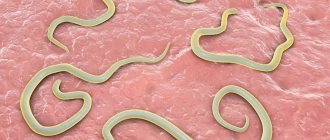Helminthiasis is a serious parasitic disease that affects not only people, but also animals. Helminth eggs hide in places that people and animals do not avoid: grass, food (especially poultry, animals and fish), soil. Even air and water can be enriched with parasite eggs. To eliminate the possibility of infection, you need to monitor not only the health of your body, but also the health of your pets. In particular, cats. It is important to be able to recognize the symptoms and know what to give your cat for worms.
What to look for when choosing an anthelmintic
Anthelmintic drugs for cats vary according to many criteria - from manufacturer to price. But the following factors become decisive, so you should focus on them when choosing an anthelmintic.
Who is the drug intended for?
It is important that among the “target” animals (those for whom this remedy is suitable) cats are listed. This is due to the fact that the active substances, their therapeutic concentration, frequency of administration, etc. are selected for a certain type of metabolism and other characteristics of the body. Accordingly, an anthelmintic, for example, for birds, farm animals or reptiles will not be suitable for a cat, nor vice versa.
Composition of the drug
If the animal has an allergy or individual intolerance to any medicinal substances, it is important to take this into account when choosing an anthelmintic. If, from previous experience, you already know that your pet reacts “ambiguously” to a certain drug, then the next time you prevent or treat helminthiasis, you should choose a product with a different active ingredient. Attention! You need to pay attention specifically to the active substance, and not to the commercial name of the drug.
Age of the cat
Although dewormers for cats over a year old and young kittens often use the same substances, the dosages may differ. As a rule, it is easier to give a liquid suspension to small kittens. It is easy to dose, and if the kitten is very small, less than 1 kg, the suspension is easy to dilute. If you give an “adult” tablet to a kitten, this will have a bad effect on its health, since the dose of the active substance may be too high.
Release form of the drug
It is not enough to know how to properly administer anthelmintic medication to a cat. She needs to “agree” to accept him. Some pets calmly tolerate this procedure, others may show serious resistance, and still others are able to remain in a state of stress for several days after being forced to take the pill and not leave the shelter. For the last two categories of animals, it is better to choose the most “calm” form of release, for example, drops on the withers. This will allow for high-quality treatment against worms and not injure the cat. Also, drops on the withers or suspensions against helminths are best chosen for pets with “increased ingenuity.” Some cats outright refuse the pills or cough them up a few minutes after swallowing them.
Veterinarian's recommendations
This is one of the most important points when choosing an anthelmintic. It is especially relevant if:
- you picked up an animal and don’t know its age;
- the cat is about to undergo its first deworming;
- previous treatment for worms was ineffective or the animal experienced undesirable reactions to the drug;
- the cat is weakened after an illness or is underweight;
- the animal has any chronic diseases;
- the cat is pregnant or nursing kittens.
After examining your pet and, if necessary, performing routine tests, the doctor will choose the most appropriate deworming drug.
This will allow you to be sure that the chosen medicine has passed clinical trials, is approved for use in veterinary practice and is safe for cats. These drugs include anthelmintics for AVZ.
Veterinarian recommendations regarding the use of anthelmintics
Any drug should be administered strictly following the dosage, which depends on the cat’s body weight. Below are recommendations from veterinarians regarding the use of anthelmintics.
- Before giving your cat an anthelmintic, you must use flea and tick drops.
- Only healthy cats can be given anthelmintic prophylaxis.
- It is advisable to carry out the treatment on weekends so that you can observe the condition of your four-legged friend.
- 5 hours after the cat has received a dose of the anthelmintic, he needs to be given a small amount of activated carbon.
- In cases of constipation, it is worth lubricating the anus area with Vaseline oil.
- Repeated use of the anthelmintic is possible 15 days after the previous use.
"Azinox"
This drug is used to control tapeworms in cats and dogs. Such parasites can be present in the body as sexually mature individuals in the definitive hosts (usually carnivores) and form special “cysts” in the internal organs, severely disrupting their functions, in intermediate hosts (herbivores, rodents, fish, etc.). For cats, the most important infections are dipylidia, hydatigerosis and diphyllobothriasis.
Compound.
The active ingredient is praziquantel (50 mg). It causes disruption of the nervous system of helminths, which leads to their death. After taking the drug, its concentration in the blood reaches its highest therapeutic value after 30–60 minutes.
Release form. "
Azinox" is a flat tablet with a score in the middle, which allows you to conveniently divide one dose into two. One tablet is designed for 10 kg of live weight.
Features of use. "
Azinox can be used both for the treatment of helminthiasis and for the prevention of these diseases. In the first case, the drug is given according to indications, in the second - once every 3 months. Do not use on kittens under 3 weeks of age.
Symptoms of the presence of worms
Any disease has stages of development. To prevent the disease from progressing, symptoms must be identified by observing and examining the cat. Here are several criteria that can confirm the presence of a parasitic disease:
- rare but severe cough;
- lack of appetite;
- causeless weight loss;
- bowel movement with bloody discharge;
- specimens of parasites in feces;
- bloating (inflammation in the small intestine);
- hard abdominal cavity;
- microflora disturbance;
- diarrhea (worms produce prostaglandin particles, which cause watery diarrhea).
In advanced cases, to the already mentioned symptoms, new ones are added, which have an even more significant effect on the overall health of the animal:
- insufficient bowel movements (parasites irritate the intestines and interfere with the absorption of fats and other substances, thereby forming a buildup in the colon and, as a result, constipation);
- high temperature (the body is trying to kill parasites);
- allergies (helminths can locally destroy the intestines, as a result of which food particles enter the blood and cause inflammation);
- a significant decrease in activity (due to a deficiency of nutrients in the body, which cease to be absorbed with the appearance of parasites);
- violation of the skin (a large number of worms in the body provokes the appearance of rashes, boils, ulcers, etc.);
- pale eyes;
- brightening of the oral cavity;
- muscle and joint pain (worms can migrate, in this regard, muscle tissue is injured and the immune system begins a fight, which results in inflamed muscles);
- pain in the liver (happens when helminths form a plug in the bile duct).
IMPORTANT! Worms greatly weaken cats and if left untreated, the animal can die. Death occurs due to intestinal rupture. And the rupture occurs due to blockage.
"Alben S"
This is a complex-action drug that is designed for the treatment and prevention of helminthiases caused by round and tapeworms.
Compound.
The active ingredients are albendazole and praziquantel, which provide the complex effect of Albena S. The drug is used for the treatment and prevention of a wide range of diseases caused by helminths. Albendazole and praziquantel affect most stages of the development of roundworms and tapeworms that parasitize cats.
Release form.
The drug is available in the form of flat tablets, each of which is designed for 5 kg of animal body weight. For ease of use, one dose can be divided into two. For this purpose, there is a line mark on each tablet.
Features of use. "
Alben S" is not recommended for deworming in pregnant and lactating cats, as well as in kittens under 3 months of age.
What danger do parasites pose?
Many parasites are dangerous to the health and life of not only cats, but also their owners. These include fleas or helminths. Skin flakes, secretions of the sebaceous glands, and blood become food for pests. The animal experiences pain and becomes restless. Severe cases cause the development of anemia or anemia. Blood-sucking inhabitants can cause a dangerous disease - infectious anemia. Fleas provoke skin inflammation, helminths lower immunity.
In case of infection, it is very important to start treatment promptly. Medicines that can be universal or, for example, only against intestinal parasites, will help. The doctor must prescribe treatment, and the pet owner must follow all his recommendations.
"Dironet"
This drug can be called the most versatile, as it is designed to combat a wide range of parasites in cats, and is available in several pharmaceutical forms, both liquid and solid.
Compound.
The active ingredients of the drug are pyrantel, praziquantel and ivermectin. Pyrantel and ivermectin cause a disruption in the transmission of nerve impulses in certain muscles, as a result of which round helminths develop paralysis and die. Praziquantel acts in a similar way, but on tapeworms.
Release form. "
Dironet" is available in the form of tablets, suspensions and drops on the withers. Separate preparations under this name have been developed for different age categories (for adult cats and kittens). This allows you to accurately select the dosage for animals depending on age and body weight.
How to use.
One tablet of the drug is designed for 4 kg of cat’s body weight. By dividing it into parts, it can be used for animals with less weight, but it is not recommended to give the drug to pets weighing less than 0.5 kg.
Suspensions and spot-on are used according to the instructions; the dosage of liquid forms is more convenient for animals with low weight.
Causes of parasites
There are many reasons for external and internal pest infestations. They are equally dangerous for all animals: street and domestic.
Reasons for the development of worms
Helminth larvae enter the house with shoes. After which it enters the animal’s body when it cleans its paws or fur.
Other reasons:
- larvae travel on fleas or lice eaters;
- raw fish;
- communication with infected animals;
- intrauterine infection.
Raw meat carries diseases even after being frozen and washed. Most often, helminths settle in river fish; their body is the most favorable for their maturation.
"Febtal"
A broad-spectrum anthelmintic that is effective against both round and tapeworms.
Compound.
The active ingredient in Febtal tablets is fenbendazole. It causes irreversible metabolic disorders in parasites, which leads to their death. The drug is used in the treatment and prevention of helminths that parasitize the intestinal tract, lungs and other systems and organs of animals. The Febtal Combo suspension contains albendazole and praziquantel. These substances affect the integrity of microtubules in the intestinal cells of helminths and disrupt energy processes, which leads to the death of parasites.
Release form. "
Febtal" is available in tablet form. One tablet is designed for 1.5 kg of body weight of an adult animal, for kittens (over three weeks of age) - 1 tablet per 3 kg of animal weight.
How to use.
The tablets are used once for adult animals, and for kittens - three days in a row in the morning.
Tablets for oral administration
This form of the drug appeared first, and today it is also widely used in everyday life. The photo of the deworming product for cats shows that the tablets have standard large sizes.
Therefore, if necessary, the tablet is ground into powder, which greatly facilitates the administration of the anthelmintic drug.
The drug names are similar to other forms of the drugs, and the tablet contains Praziquantel and Albendazole.
"Febtal combo"
It is also a broad-spectrum anthelmintic.
Compound.
The active ingredient of "Febtal-combo" is albendazole, which causes paralysis and death of parasites.
Release form.
Polymer bottle 7 or 10 ml with a dosing syringe.
How to use.
Apply once, individually, in the morning feeding with a small amount of food or administered directly into the mouth at the rate of 1 ml of suspension per 1 kg of animal weight.
Before deworming your pet, you do not need to keep it on a diet or use laxatives. And the instructions for some drugs clearly describe how to prepare a suspension from the tablet (in case the cat refuses to take the drug in its “original” form).
What to give your cat for worms: top 3 tips for ease of use
IMPORTANT! Before starting treatment for worms, you need to get rid of other parasites (fleas, lice eaters, etc.). If this is not done, the treatment will not be effective.
Refusal of medication is a normal reaction for any animal. After all, tablets and drops do not have an attractive appearance, taste, or smell. In order for the cat to eat the drug, it is worth approaching the issue of use with cunning:
- Grind the tablet to a powder and mix it with wet food, add to porridge or other treats that have a strong odor. This is necessary in order to eliminate the smell of the medicine.
- Use an indexer (pill dispenser). Externally, the device resembles scissors. It has a rubber fastening at the end. It is thrust into the animal’s mouth, closer to the throat, and holds the mouth until swallowing. You can do it with your hands, but this increases the risk of being bitten.
- Inject water with a crushed tablet using a syringe without a needle. Hold your mouth until the cat swallows the liquid.
Side effects
There are pros and cons to any drug. The pros are the effectiveness of the treatment, and the cons are the consequences of taking the medicine. If the drug is selected correctly, there should be no side effects, but there are also undesirable consequences, namely:
- vomit;
- diarrhea;
- foam from the mouth - from the bitterness of the medicine;
- bad breath;
- allergic itching;
- The animal behaves unusually and refuses to eat because it feels nauseous.
You can avoid such consequences by taking a responsible approach to treatment and choosing medications. A timely visit to the veterinarian will get your pet back on its feet in a few days and without unpleasant consequences.
How do you recommend deworming puppies, if not pyrantel, and how often?
If a puppy is without fleas and does not go outside yet, then his mother and himself should be treated with, say, “Advocate”, “Stronghold” - this solves the problem of toxocara well. It is necessary to take into account age restrictions and whether his mother is feeding him milk. This treatment should be done once a month. If your wallet doesn’t allow it, ivermectin is given orally or injected to the entire litter (don’t forget about the age restrictions!). Milbemax is somewhat less effective, but it can be used from a very early age. It is better to use drugs containing pyrantel with adults who are not pregnant (male dogs, for example) precisely for prevention - it is convenient, cheap and highly safe.
For selections in shelter conditions, you have to choose cheaper schemes. If a puppy or kitten is picked up from the street, the first deworming should not be carried out immediately when the animal gets home, in the very first days. It is best to fatten him first, give him vitamins, then something containing pyrantel, and then ivermectin.











